Noah Jupe Honey Boy
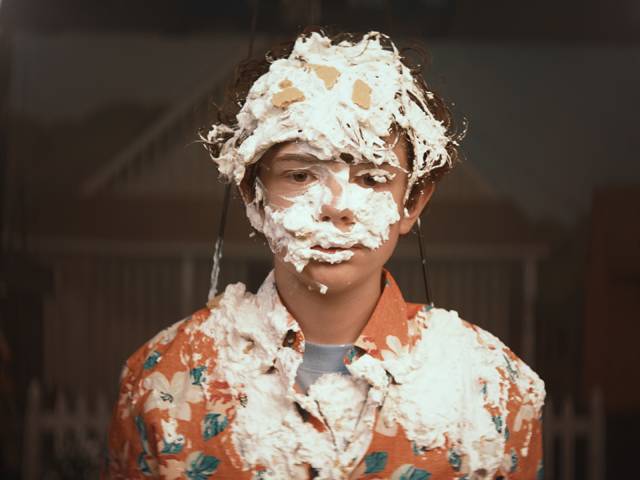
By Shia LaBeouf
Cast: Natasha Lyonne, Maika Monroe, Clifton Collins Jr., Noah Jupe, Lucas Hedges, Shia LeBeouf, Laura San Giacomo, FKA Twigs
Director: Alma Har'el
Genre: Drama
Running Time: 94 minutes
Synopsis: From a screenplay by Shia LaBeouf, based on his own experiences, award-winning filmmaker Alma Har'el brings to life a young actor's stormy childhood and early adult years as he struggles to reconcile with his father through cinema and dreams. Fictionalizing his childhood ascent to stardom, and subsequent adult crash-landing into rehab and recovery, Har'el casts Noah Jupe and Lucas Hedges as Otis Lort, navigating different stages in a frenetic career. LaBeouf takes on the daring and therapeutic challenge of playing a version of his own father, an ex-rodeo clown and a felon. Artist and musician FKA twigs makes her feature acting debut, playing neighbor and kindred spirit to the younger Otis in their garden-court motel home. Har'el's feature narrative debut is a one-of-akind collaboration between filmmaker and subject, exploring art as therapy and imagination as hope.
Honey Boy
Release Date: February 27th, 2020
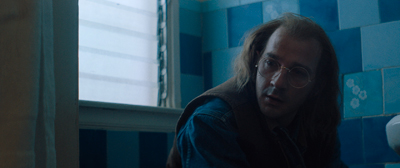 About The Production
About The Production
Actor, producer and now screenwriter Shia LaBeouf grew up in the public eye, becoming a seasoned performer by the time he was 10 and a bona fide television star at 14 on the hit Disney Channel sitcom "Even Stevens." While still in his 20s, LaBeouf was one of Hollywood's most sought-after young actors, with a resume that included the blockbuster Transformers action franchise, a pair of art-house rule-breakers from Dogma auteur Lars von Trier and a chapter of Steven Spielberg's legendary Indiana Jones saga.
But by 2017, his off-screen behavior had begun to overshadow his award-winning performances and LaBeouf seemed destined for a path faced by many child stars. Instead, a courtordered stint in rehab put him back on track as one of the finest actors of his generation and as an exciting new scriptwriter. Ordered by a therapist to write about his troubled childhood, especially his fraught relationship with his father, whom he paid to chaperone him, LaBeouf wrote his first feature film, Honey Boy, an uncommonly intimate account of a father-son relationship steeped in misunderstanding, competition, trauma " and indestructible love.
Honey Boy is equal parts autobiography, exorcism and finely honed storytelling. "The script grew out of a specific moment in my life," LaBeouf says. "It's not something I ever thought I would do, wanted to do or needed to do. But I was forced to confront my past and writing was an important part of my therapy."
Inspired by the behind-the-scenes turmoil of his early days in television, LaBeouf provides insight into the source of his demons. "As an actor, everything you do is played out through other people's ideas of who you are," he explains. "They have no clue, especially when you are so young. It's taken a really long time to get the perspective to look back on it, think about it and talk about it in a constructive way."
One of the first people he shared his early efforts with was his close friend and collaborator Alma Har'el, an award-winning documentarian known for the unique aesthetic that made her previous two features, Bombay Beach and LoveTrue, sensations on the film festival circuit. "I sent the first draft to Alma, because she is my friend and the tastiest person I know," he explains. "I send everything I make to her. Trust is a core piece of the creative process between us. She said it was a movie and a movie she wanted to make."
The pair first met about seven years ago, when LaBeouf contacted her after seeing Bombay Beach, an artful meditation on the lives of a group of outsiders eking out a life on the shores of California's blighted Salton Sea. "Sometimes it feels like we started working on this film that first night we met," says Har'el. "We had dinner and talked a lot about our fathers. I sometimes say we are both children of alcoholic clowns " my father because of his humor and childlike approach to life, while Shia's father was literally… a clown. We didn't discuss making a movie then but there was a rare kinship and understanding immediately."
LaBeouf financed and executive produced Har'el's second feature documentary, LoveTrue. "When I was struggling to get financing, I received an old-school letter from him about art and love and God with a check for the whole film's budget," she recalls. "No contracts. Just pure support. The thing that strikes me now is that LoveTrue featured people dramatizing their lives and memories with younger versions of themselves. So looking back at everything we did together, it all led to Honey Boy."
Har'el's previous work has dealt with misfits of many kinds, people surviving outside of the mainstream. "In many ways Shia is the ultimate reject because he refuses to play industry games," she notes. "He represents both good and bad things to many people but very few actually know the mental health issues he struggles with. He's also one of the funniest people I know. It was obviously his entry point into acting and in Honey Boy he shows that he is now mature enough to marry his humor with his pain."
The image Har'el had in her mind during development was of Otis Lort, LaBeouf's cinematic alter ego, as Pinocchio. "He is a boy who is controlled by others," she explains. "He wants nothing more than to step off the marionette wires and be a real boy, but he keeps lying, which causes his nose to get bigger for everyone to see. Pinocchio can become a real boy only if he proves himself to be 'brave, truthful, and unselfish.' In the end, his willingness to provide for his father and devote himself to being those things transforms him into a real boy."
The children's parable is an apt metaphor for LaBeouf's life, according to Har'el. "His mistakes have never been hidden," she observes. "Everything was there for the world to see and judge. Hearing some of the stories about what happened in his childhood over the years, and the fact that he provided for his own father while struggling with all this made it possible for me to understand how extraordinary his efforts are to own his destiny and be the man he wants to be."
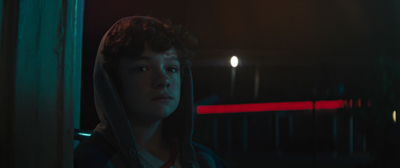 Getting It on Paper
Getting It on Paper
It was an off-set scuffle while filming in Savannah that forced LaBeouf to acknowledge his life was out of control. A lengthy stay in rehab included an assignment to confront his past by writing about it, and it seemed natural to write in the format he most often reads: a screenplay. The challenge of writing was unexpectedly satisfying, he says. "I have to use different parts of me than when I'm acting. Doing both at once was a lot and then also I added a layer on top of this by telling my own story."
Har'el says LaBeouf turned out to be one of the best writers she's come across. "His voice was so strong. I was immediately struck by the specificity of the characters, the language, the musicality. He writes for actors and not for the director, so it was a challenge to make it cinematic without hurting the exceptional dialogue."
The draft Har'el first received was a short film set in a motel room detailing the conflicted relationship between a child who is the family breadwinner, but who desperately needs his father to be in charge, and a man both in awe and resentful of his son's success.
"The idea of entering your own trauma and playing your own father as a form of therapy was something very close to my heart," says Har'el. "The film we made together prior to this, LoveTrue, dealt with acting out your own memories and trauma through therapeutic performance.
In that movie, people played scenes with their younger selves, where here he is portraying his father, playing against another actor playing his younger self. It's pretty meta but we kept it emotional and grounded in reality"
According to LaBeouf, Har'el's approach to filmmaking mirrors aspects of gestalt therapy, in which patients use role playing to help resolve past conflicts. In what would become an extraordinary collaboration, LaBeouf and Har'el began expanding the initial script. LaBeouf's first drafts did not include the adult Otis, but Har'el advised him that seeing the young man coming age in the wake of a lifetime of emotional chaos would give the film a powerful context. She also encouraged him to include his journey through rehab.
"We started rewriting " a lot " I think we did between 80 and 90 drafts," recalls the director. "He was still in rehab when we started, so he would send me pages and I would write notes back or do a pass on something, send it back and by the time I would wake up there were three more drafts. Making it a creative exercise made therapy more possible for him and he started ferociously writing."
Creating the role based on his father was the central part of the process for LaBeouf. "It just poured out of him," says Har'el. "He battled with that character because he wanted to give him the respect and honor he deserved, as well as to understand and forgive his father. Shia had a harder time writing Otis, in part because he didn't want to create a flattering portrait of himself. But also it was hard for him to have empathy with little Otis. He was so young at the time, but he doesn't see himself as a child. He felt like an adult, which I think is not unusual for children of addicts. He was focused on capturing the unspoken expectation of manhood that has shaped his life. It revealed the shame and the abuse that he dealt with and the difficult love-hate relationship he had with his father."
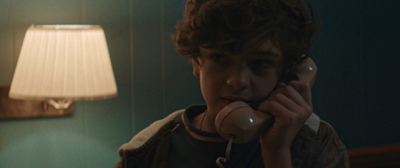 The Heart and Soul of a Story
The Heart and Soul of a Story
Har'el began to put together an eclectic team of ambitious producers to realize her vision for the film, including Christopher Leggett, with whom she has worked for more than a decade; Anita Gou, founder of the production company Kindred Spirit and producer of indie hit The Farewell; Brian Kavanaugh-Jones of Automatik; and Daniela Taplin Lundberg, one of the producers of Beasts of No Nation and the upcoming Harriet.
"Alma's been interested in moving into the scripted world for a while," says Leggett. "She has a gift for finding the truth with her work, using her poetic language to get behind the mask of perception. She was just waiting for the right project."
Kavanaugh-Jones remembers only knowing that Har'el had a script written by LaBeouf that she intended to direct when he started reading Honey Boy. "I cried all the way through," says the producer. "It felt like a beautiful universal story and I had to do it. I've never seen people who worked harder to find the heart and soul of a story."
The script combined humanity with naked truth without ever becoming self-indulgent, says the producer. "When you sit down with Shia, he is so raw, honest and human. He acknowledges his faults and challenges, and this is as authentic an account of success and failure as I have ever seen. It's deeply emotional without ever feeling maudlin."
Lundberg too was moved by LaBeouf's willingness to share his painful aspects of his life so publicly. "It takes a lot of courage to put your past personal trauma and family relationships on the screen for the world to see," she says. "But Alma and Shia always knew where the script needed to go. The process felt critical for him to move past his self-destructive behavior. He was totally professional."
Gou was impressed by Har'el's respectful approach toward the characters " and the actors " which she attributes to the director's background in documentaries. "She's almost maternal, but with a strong sense of whimsy," says Gou. "Through delicate dances, she finds what is real and true in her documentaries and she applies the same techniques to this film. It takes a pair of extremely steady hands to navigate the blend of fiction and nonfiction."
Har'el agrees that her documentary work has given her an unconventional approach to narrative film, but she says she always took a strong narrative approach to documentary filmmaking. "The biggest difference was the scripted nature of some of the scenes and the lack of freedom that narrative work has in comparison to how I roll as a doc filmmaker, which is totally solo and wild. The natural evolution I felt was the evolution of my relationship with Shia and our kinship around our childhoods and art. He challenged me artistically every day, and what kept me going is that we were meant to make this film together and tell our story as children of alcoholics, which is something that is often told just from the perspective of addiction. This is more a story about the legacy of addiction and how self-expression can lead to forgiveness and love."
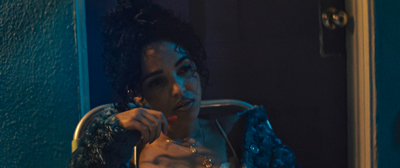 The Son Becomes the Father
The Son Becomes the Father
Honey Boy's flawed father figure, James Lort, is a damaged veteran, ex-con, former rodeo clown and an alcoholic with a hair-trigger temper " just as LaBeouf's father, Jeffrey LaBeouf, was. As extreme as his imperfections are, LaBeouf has both written and embodied a character whose humanity is undeniable, creating unexpected sympathy for him.
"Despite the emotional and verbal abuse he inflicts on his son, you see him struggling to be a better father and fight his demons every day," says Lundberg. "Shia brings the character such charisma and humor that you are drawn to him. There will be moments when you hate James, but you never want him to fail. It's a testament to Shia's devotion to his father."
Shambling, bespectacled and sporting long sideburns and a mullet, LaBeouf transforms himself into a man who can easily be overlooked " and often is. Initially, he imagined another actor in the role. "I thought I would play the older Otis, but Alma said she didn't want to do it unless I played Pop."
According to Har'el, "If Shia didn't play his father this film would have just been a biomelodrama as opposed to a psycho-magical-cathartic experience. One of the smartest things Shia did in his script was to recognize the parts of himself that resemble his father. Whether he inherited alcoholism or developed anger issues, by portraying his father he took ownership of them in a brilliant way I've never seen before. It was kind of mind-blowing to me to realise that as we were filming. I don't think I understood how much of his father he battles every day."
Playing James, says LaBeouf, gave him a chance to learn to love his father from the inside. "I guess I've been preparing for this my whole life," he adds. "My relationship with my father has shaped a lot of who I am. Being able to put an incredibly personal and painful time of my life onscreen is one of the biggest achievements in my career. I don't know where I go next, but this is something I am proud I was able to do."
Producer Leggett says he has rarely seen an actor as dedicated as LaBeouf. "He was absolutely determined to go wherever this took him. For me, watching him play his father was so complex. He became James. He brought empathy and understanding by going back to those memories and living them on the other side."
The meta element of Honey Boy was essential to keeping the story from becoming a straight biopic, according to Kavanaugh-Jones. "He is shockingly good in this. Every take was different and every moment seemed new. I don't know what it would be like emotionally to reengage with such a challenging relationship. The pain " and hopefully the catharsis " involved were as intense and personal as possible."
On set, LaBeouf quickly discarded his writer's hat and concentrated on playing his role, Har'el says. "Shia was humble and never wanted to interfere with Lucas Hedges or Noah Jupe. He supported them in any way he could: answering any questions they had, letting them into his house and his closet, but also encouraging them to take liberties and create Otis together. In that way, Otis became his own person."
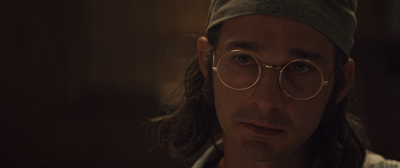 Otis x Two
Otis x Two
LaBeouf preferred not to be present when scenes in which he did not appear were filmed, and didn't see much of the film until Har'el showed him her final cut. "He was available to us if we wanted him to clarify anything, but he was never looking to control how we portrayed him. His only interest was embodying his father and trying to understand what happened between them."
While she considered casting an actor who resembles LaBeouf in real life to play the adult Otis, Har'el ultimately decided against it. "That could have become a case of narcissistic mirroring of the real Shia," she says. "But I was lost until I met Lucas Hedges. Within two minutes I knew he was the answer to everything. He has the same thirst for truth as Shia, and I could tell he was interested for the right reasons. This was a sort of artistic exorcism and Lucas had the mystical connection you need to have with art in order to participate in this. He's heavy magic."
Hedges, the first actor other than LaBeouf to be cast, has earned a reputation as a serious and ambitious actor. Still in his early 20s, he has already appeared in such acclaimed films as Three Billboards Outside Ebbing, Missouri; Lady Bird; Ben Is Back; Boy Erased, for which he received a Golden Globe nomination; and Manchester by the Sea, for which he received a Best Supporting Actor Oscar® nomination.
"Lucas' presence elevated the project, and casting him was such a gift to the film," says Lundberg. "In the hands of a less skilled actor, his role could have been overshadowed by the electric dynamic between Shia and Noah. Instead, Lucas provided the pathos, fear, and at times, sweet sincerity of a young man struggling to come to terms with who he is and where he's come from. In the end, you just want to give him a hug."
As the film opens, the former child actor has become an adult star of blockbuster films, explains Hedges. "He got in an affair with his co-star, then crashed his car while drunk and high. We get to know him while he's struggling through rehab. His biggest fear at this point is who he might become without his pain."
Hedges was interested in the film as soon as he heard that LaBeouf was involved. "He is an important actor and a huge influence on me," he says. "I feel like I had an intense and complicated relationship with him before we ever met! Then I did some research on Alma and was even more intrigued. When I met her, I felt a really powerful spiritual connection. We talked about work as a means of feeling and growing closer to yourself. I knew I wanted to be in this movie."
Har'el's documentary filmmaking experience has given her a finely tuned sense of what looks natural on camera, the actor says. "She's much more interested in psychology and moment-tomoment reality than in trying to create great acting moments. All of her work blurs the line between real and surreal, reality and fantasy. She sees the two as equally important and believes that fantasy can increase the level of creativity. It's the best of both worlds."
Hedges says he spent hours studying LaBeouf, both in person and in films, to get a sense of his physicality as well as his emotional core " then discarded everything he felt was extraneous. "I had to walk the line between how much to take from him that would make the character juicy and rich, and where I should trust my instincts. Otis is still reckoning with wanting to please his father, while trying to get him to be the dad he needs."
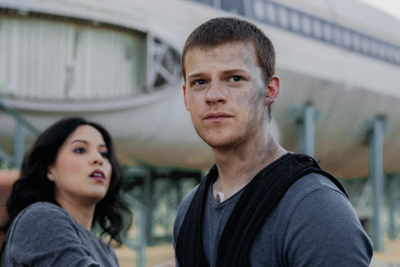 Noah Jupe, who made a splash with his appearance in A Quiet Place, plays Otis Lort at age 12. It was Kavanaugh-Jones, who had worked with Jupe on the 2018 sci-fi feature The Titan, who suggested Har'el meet with the young actor. "The kid is just a staggering talent," says the producer. "We did a huge search for the right boy and he worked hard to win the role. He and Shia together are astounding."
Noah Jupe, who made a splash with his appearance in A Quiet Place, plays Otis Lort at age 12. It was Kavanaugh-Jones, who had worked with Jupe on the 2018 sci-fi feature The Titan, who suggested Har'el meet with the young actor. "The kid is just a staggering talent," says the producer. "We did a huge search for the right boy and he worked hard to win the role. He and Shia together are astounding."
Described by several of his colleagues as "the most mature person on the set," Jupe's experience as a child performer is significantly different from LaBeouf's. His parents, also actors, accompanied him to the set, and instead of relaxing with a soda between takes, Jupe wrestled with quadratic equations and tectonic plates with the help of a tutor.
"Noah is an old soul and wise beyond his years," says Gou. "He understood the complexity of the story and the role. He and Shia had insane chemistry almost instantly."
The two, plus Hedges, spent considerable time together off set building close relationships. Jupe and his family even lived with LaBeouf for a while and bonded by watching baseball, learning to juggle and playing Rummy and the game Magic: The Gathering. "I never managed to beat him, but I'm honored to call him my friend," Jupe says. "I learned so much about acting from him and felt very protected by him. He is one of the most exciting, caring, funny " especially funny " people I have ever met. I really hope we get to work together again."
LaBeouf says when it comes to professionalism and the ability to improvise, Jupe can match any adult he has worked with. "The kid had the reserves and technique to run 12 pages straight. He could also float with me when we went off book, which we did a lot."
Har'el had been leaning toward casting a non-actor in the role. Her initial reservations about working with a professional, especially a young British actor, disappeared when Jupe auditioned. "I had my doubts about whether he could convincingly play a scruffy American kid, but when he came in to read with Shia, they were father and son right away. You can have serious conversations with him about anything and he grasps it. Noah has made many successful films, but I think this role will solidify him as one of the strongest actors of the next few decades."
Jupe's thoughtfulness and emotional maturity are apparent when he talks about Otis and his father's onscreen interactions. "There's so much love there, but it's pushed down deep into the shadows of their relationship," he observes. "All Otis wants is for his dad to behave like a normal dad and maybe show him some affection. But his dad thinks you're a wuss if you do that. "Alma really cares about her actors and takes so much time to get to know them," he adds. "She made us all feel safe on set. She always found time for me. She is truly an amazing director, a beautiful human being and a friend for life."
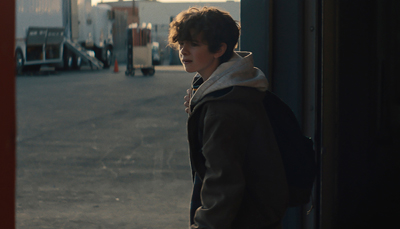 No Small Parts
No Small Parts
Making a memorable film acting debut, recording artist FKA twigs brings quiet strength, vulnerability and a maternal moment to the role of Shy Girl, a teenaged prostitute living in the same complex as the Lorts. Like Otis, she is far too young for the world in which she finds herself, and the two develop a special bond that transcends the motel squalor. "To Alma's credit, she was so open to finding different kinds of people for some of the smaller roles," Kavanaugh-Jones says. "Twigs is an incredibly soulful person and a consummate artist. Alma gave her a safe space to work and she thrived."
"It's common for films directed by men to create a separation between the mother and the whore," says Har'el. "I tried to have a character that's both. Twigs did an incredible job embodying Shy Girl. She has an ability to be otherworldly and very strong at the same time."
Other supporting roles are filled by well-known actors, including Martin Starr, Laura San Giacomo, Clifton Collins Jr. and comic Byron Bowers as adult Otis' roommate in rehab. "Byron was a big piece of the puzzle when we were casting," says Har'el. "He comes off the TV show "The Chi" and it's his first film, but his improvisational skills were essential. They all had chemistry that really translated to the screen and gave performances that perfectly defined the tone and world we created."
A Sense of Place
The majority of the film's action takes place in the Lorts' motel home or Otis' rehab facility. Production designer JC Molina was instrumental in finding ways to bring small details that made each setting feel familiar and lived in, according to Har'el. "We never used anything new and there was a color palette we stuck to," says the director. "I prepared a lot of mood boards and showed Shia photographs of what we were scouting. He would let me know if things were off " if something looked too fancy for instance. I wanted very much to get the right socio-economic tone of where he grew up. I relied a lot on my documentary filmmaking: having a gut feeling when things don't feel real helped me."
After scouting throughout Los Angeles, the filmmakers settled in Sun Valley, a working-class community in the northeastern San Fernando Valley. "When we came to the motel it was actually pink," the director says. "It's even called The Pink Motel. We decided to paint it, which was not an easy thing to do on such a small budget, but JC pulled it off. I wanted it to have the colors of an old circus poster and feel like it was a part of James. I could just see Shia and his father living there."
In real life, LaBeouf's stint in rehab took him to a stripped-down retreat in upstate New York. Har'el was determined to find something that in no way resembled the luxurious facilities in posh locations like Malibu normally associated with celebrities. "I tried to stay true to the photos he gave me of the rehab facility he spent time in. I also wanted something that existed outside of a specific place because of some of the more magical ideas the movie deals with, including art as medicine and imagination as hope. We also wanted to capture the way it made him feel about his own privilege."
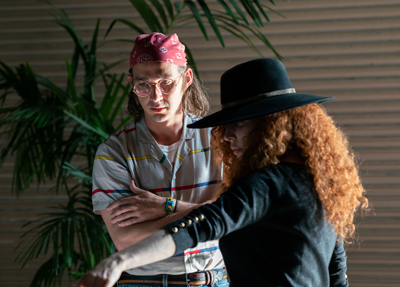 Picture Imperfect
Picture Imperfect
Finding a director of photographer who was in sync with Har'el's distinct visual style was a critical element, says Kavanaugh-Jones. "We spent a lot of time looking," he continues. "Alma was hoping to work with an awesome woman on this and I think Natasha Braier is one of the top 10 cinematographers in the world. They hit it off immediately."
When Har'el met the Buenos Aires native, she knew she had found a collaborator she could count on. With a resume that includes Nicolas Winding Refn's psychological horror film The Neon Demon, it was clear she had the kind of visual imagination and technical skills the director was looking for. "There are a few incredible women cinematographers I spoke with and would love to work with in the future but Natasha was not my first choice " she was my only choice," says Har'el. "Watching her prior work convinced me she can do anything. I learned so much from her. She approaches everything she does with an artistic eye as well as a psychological perspective."
Braier, the daughter of two Freudian psychiatrists, says she is fascinated by the therapeutic process. "Knowing that Shia wrote it in rehab was really intriguing to me," Braier says. "There is such intense emotion throughout. Alma has a very strong visual approach in the way she uses film language. The entire film is in some ways a crazy experiment and she is a great partner to go into that adventure with."
One of Har'el's requirements was that the camera allow the actors the freedom to be spontaneous. Especially in the close quarters of the cramped hotel room, it took a combination of meticulous preparation and a willingness to stay in the moment to let the scenes unfold naturally. "We wanted to capture something very real and raw in the same way documentaries do," says Braier. "With Noah and Shia, it wasn't always possible to predict where they might sit or stand or go. We embraced that and let the actors move freely, while the camera flowed with them, without any anticipation of where the action would be going."
To accomplish that, Braier set up lights throughout the room, trying to prepare for all possibilities. "We couldn't just light for 360 degrees to see everything and keep the rawness and honesty," she says. "I put together a system with lots of different lighting connected wirelessly to transmitters, receivers and DMX boards, and a radio so that I could communicate to the camera operators in the room. It was like the camera had to improvise along with the actors."
Following along on the monitor, she was able to constantly adjust the lighting to be warmer or cooler, or create contrast, depth and color. "It was like a jam session," she says. "I tried to have as many different possibilities rigged and ready to go on my dimmer board. The tools were ready and then I had to react in the moment. It worked really well for Alma's style because she doesn't care about the conventional rules of filmmaking."
Once in the editing room, Har'el found that the script's linear, chronological approach to the story felt unsatisfying. She went back over the footage and began to build a more impressionistic narrative with editors Monica Salazar and Dominic LaPerriere, starting the story with the adult Otis as his life unravels and creating a montage out of already existing material that tells the audience everything they need to know about the character in under two minutes.
"It is an incredible sequence and in the abstract, I would have said it wouldn't work," says Lundberg. "But it's perfect. It's an example of how bold and unafraid she is."
As the film continues, Har'el switches back and forth between timelines. "She worked long and hard on the ending," says Lundberg. "It was a tricky landing to stick but she did it."
Drawing on her vision of Otis as Pinocchio, Har'el worked with composer Alex Somer (Captain Fantastic) to put together the film's soundtrack. "He was a brilliant partner," she says.
"We really got into it together and brought great musicians like Zach Shields and Paul Corley to work with us. I wanted to have a score that used a lot of small sounds inspired by Pinocchio, marionettes and the circus. Alex has a studio full of strange little toys and old instruments, so it was the perfect playground. Trying to finish the film in time for Sundance created a tough deadline and I'm so thankful for his artistic devotion."
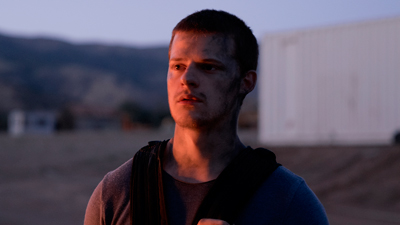 Moving Forward
Moving Forward
Despite a limited budget, Har'el and LaBeouf had exacting ideas of what they wanted and never took no for an answer, says Kavanaugh-Jones. "If we couldn't give them exactly what they wanted, they would look for another way to achieve it," the producer explains. "Every aspect was pushed to the highest level without a lot of money to support it. It's very rare you make a movie this challenging and come away feeling like a family, but we did. In the end that is a testament to Alma and Shia."
The result of all that hard work is a film that is bigger than just the story of LaBeouf and his father, Har'el believes. "Even if you don't know anything about Shia you can still watch it as a father-and-son story. If you do know Shia's story, there is an extra meta layer you can bask in that's kind of winking at you, but it's never trying to steal the show from the father-son story."
There were so many unusual aspects to the film, says Har'el, but the most difficult task was to bring both young Otis and adult Otis to life and find the truth for both of them. "Doing that while dealing with the meta aspect of this film was my biggest challenge," says the director. "In my opinion there is no truth without reflection on the inner life of a person. In all of my movies I try to find symbolism and imagery that is unique and personal to each character. Shia's world has always been reflected back to him through the parts he's played. There's something fable-like about his personal mythology that connects with all my prior work. I tried to capture that while keeping his own way of seeing his life."
Har'el says one of the film's most important themes is the role of self-expression as medicine. "All of the themes in this movie are at the root of what made it possible for me to stay alive," she says. "Learning to express myself has allowed me to forgive those who hurt me and to understand what love is. My family has lived in the shadow of my father's alcoholism my whole life. My love for him and for them inspired me throughout the making of the film."
Anyone looking for a cautionary tale about what addiction does to a family should look elsewhere, she says. "If the movie creates a platform for children of alcoholics to talk, that will be my dream. Any dialogue about family and love and addiction is worth having. And I hope as many children of alcoholics and children who went through any kind of verbal or physical abuse will see this film. I wanted to tell this story for all of them. But I never want to tell anybody what to feel or take from the film.
"When I think of all three of my features," she continues, "there are themes of masculinity, the mythological figures in our lives, the effects of addiction on second generations and the thin line between being ourselves and performing ourselves for others. There are no simple solutions to trauma and addiction " as Shia and I always said to each other " the only way out is through. I found in my life that forgiveness and acceptance through creativity and imagination are the only way out. This seems to be something that is folded into all of my movies so far and this movie felt like it brought me to a new stage of communicating all that."
LaBeouf admits it's hard to explain what it feels like to play your own father. "I'm still working through a lot of this, but it's all part of my recovery and it had to be as honest as possible. I showed it to my father when it was completed and there were definitely a lot of hard conversations, but we are close and continue to work through things. It's helped me to figure out why I did what I did. I want to continue growing as an artist and not be defined by one medium or one type of character."
LaBeouf's commitment to reconciling himself with a relationship he calls both toxic and passionate is far from over. "The story is all about family, love and forgiveness," he says. "The bond that formed in the process of making the film was key to making something that feels genuine, and with a lot of heart. I can only hope that opening up my life and my story for others to see will help someone know they are not alone. That everyone has a story and a battle to overcome.
Release Date: February 27th, 2020
MORE



